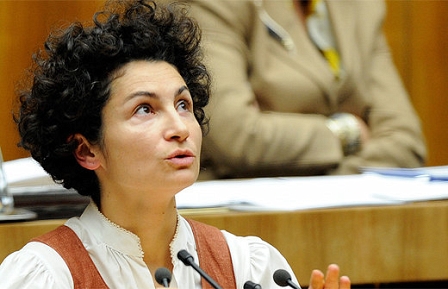Erstellt am: 15. 9. 2011 - 16:08 Uhr
Ich bin kein Fremder
Natalia Zamabrano Jaramillo is a Colombian citizen, but for over eight years Austria has been her home. The 27 year old feels at home in this country. Often, she admits, she feels more at home here than in the country she left as a teenager. But according to the law she is not at home here – she is one of the million people living in Austria who, because they don’t have an Austrian passport, are officially designated as "Fremder" – a foreigner.
"For me 'Fremde' means someone who doesn't belong here," she says. "When I am described as a 'Fremde' it makes me feel as if I shouldn't be here. For me the term seems very negative. That's also because of the way it is used by politicians."
Connotations of alienation
As a legal term "Fremde" might not be quite as quite as bombastically negative as its American equivalent legal term "alien", but nonetheless it has connotations of alienation. It's no coincidence that when Albert Camus' famous 1942 story of estrangement and disaffection, "L'Ètranger", which is known as "The Outsider" in English, was translated into German, the title chosen was "Der Fremde".
The human rights group SOS Mitmensch has just launched a new initiative called "Wir Sind Keine Fremden" or "We are not foreigners", designed to draw attention to the negative connotations of the legal term. The word "Fremd" peppers the Austrian law books. We have the Fremdenpolizei, the "foreigner's police" who enforce the Fremdengesetz or "foreigner's law". SOS Mitmensch spokesman Alexander Pollak doesn’t like it one bit: "Words determine the way we think and often they determine the way we act. They are essential for the way we perceive things" he says. “That`s why we don’t think "Fremde" is an adequate term to describe people whose lives are based in Austria. He suggests that the term is replaced in the law books with the term "Wohnbürger" which would roughly correspond to the English term resident.

SOS MITMENSCH
According to SOS Mitmensch, the majority of Austria`s "Fremden" have been living in Austria for over 5 years, most of them working and paying Austrian taxes. Life here is no longer foreign to them but the law suggests that it is. Pollak says the term Fremde, with its negative connotations, has led to an artificial distance between those living here who have an Austrian passport and those have not – and this artificial sense of suspicion has practical side-effects. "It has implications on many aspects of everyday life: the way you are treated if you go to the bank for example. They are so many situations every day in which you are treated differently depending on whether you are an Austrian citizen or not."
Anna Durnova, a Czech citizen with a university degree and a well paid job who has lived in Austria for 14 years, describes how she had difficulty getting credit. She says the bank employees suggested that if she ran up debts she might just up sticks and leave the country.

APA
Alev Korun, the human rights spokesperson for the Greens, has hailed the SOS Mitmensch initiative as a "wake-up call" for civil society. She said that the hundreds of thousands of people without an Austrian passport who have been living in Austria for decades are "part of our society", adding that "to constantly denounce then as fremd and to thereby alienate them, as the government as well as right-wing populists have done, is a disservice to life as a community in Austria."
Equal before the law
It has to be said that things have improved in recent years. When I arrived in 2002, and was scouring through adverts for rental apartments, several of them baldly stated only "Inländer", or Austrian passport holders, need apply. Discrimination laws have since banned such exclusion but SOS Mitmensch wants a change in culture. They want the wording of the law to change so that even those who do not or cannot take up citizenship in Austria are encouraged to feel at home.
Political scientist and book author Gerd Valchars puts it simply "There is an article in the Austrian constitution which states that all citizens are equal before the law. The word citizen should be changed. All people should be equal before the law."


